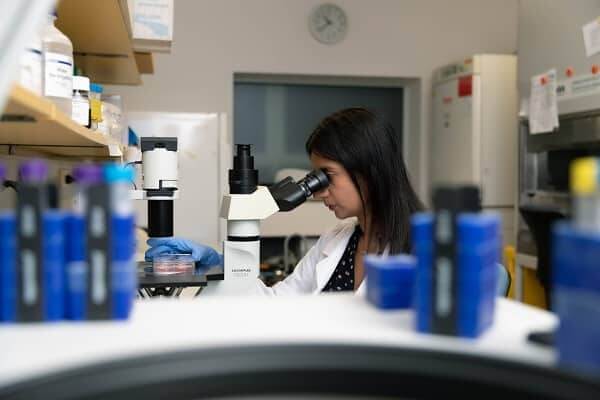At the 2022 NSW Premier’s Prizes for Science & Engineering announced on 1 Nov, Sydney’s Dr Sudarshini Ramanathan was named the NSW Early Career Researcher of the Year (Biological Sciences).
Dr Ramanathan FRACP PhD (USyd) is a Neurology Staff Specialist at Concord Hospital, and a Senior Research Fellow at the Sydney Medical School of the University of Sydney.
Her felicitation comes for her work in the field of autoimmune conditions of the nervous system – in particular, for defining a treatable autoimmune brain disorder now known as myelin oligodendrocyte glycoprotein antibody-associated disease (MOGAD).
MOGAD is an autoimmune disorder which may present with blindness, paralysis, or seizures. While it shares some symptoms with multiple sclerosis (MS), and may be misdiagnosed as such, the underlying disease mechanisms, treatment, and prognosis are very different.
It was Dr Ramanathan’s early work at the University of Sydney that helped establish MOGAD as a separate disease entity from MS.

Today she leads a research team investigating this condition, and other antibody-mediated neurological disorders further.
“MOGAD was first recognised as being relevant in adults only in 2014,” Dr Ramanathan told Indian Link. “Before this, these patients were often misdiagnosed as MS, and managed with unsuitable immune therapies; or remained undiagnosed and untreated, thereby risking permanent disability.” Many of the conditions Dr Ramanathan and her team study are similarly relatively recently recognised.
MOGAD can cause inflammation in the optic nerves, spinal cord and brain. In this disorder, the body’s immune system produces antibodies which target the MOG protein that is found on the surface of myelin (which wraps around each nerve cell).
“This condition can cause significant disability, including blindness, paralysis, seizures, and cognitive impairment,” Dr Ramanathan elaborated. “It can present in children as well as adults. The aim of our work is to understand underlying disease mechanisms, diagnose this disorder early, and ensure the appropriate immune treatment is commenced as soon as possible.”
Thanks to her work, MOG antibody testing is becoming part of routine clinical diagnostics in patients with autoimmune brain conditions. The treatment strategies developed by her team are now adopted internationally; and in Australia, her advocacy has seen specific immune treatments become available for patients nationally through Medicare.
Dr Ramanathan will receive a prize of $5000.
She is one of five women in the ten winners announced this year, including of course the NSW Scientist of the Year Professor Glenda Halliday FAA FAHMS, also of the University of Sydney.
“It is an exciting time for women in STEM,” Dr Ramanathan noted. “We should be encouraging young girls who are interested in science and medicine to pursue a career in this discipline. It is important for young women to be able to see that a career in science can be enjoyable and fulfilling, and it is a privilege to be able to improve the health of patients.”
Of course, representation and role models are also significant, she added.
As a young mum herself and as someone who enjoys her work tremendously, Darshi Ramanathan would certainly be a worthy role model.




